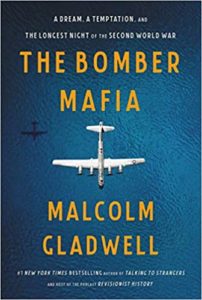
The Bomber Mafia
By Malcolm Gladwell
Published in 2021 by Allen Lane
This was The Mules’ book selection for July.
Malcolm Gladwell is one of my favorite non-fiction authors. His books are about ideas. Interesting, often contrary ideas that have an enduring impact on my thinking.
One example: The Tipping Point, which presents his theory on how trends take shape and sometimes take over. (I use this idea all the time when discussing marketing and product development with business colleagues.)
Another example: Blink, which explores the concept of “thin-slicing” and explains why spontaneous decisions are often better than carefully planned ones.
A third example: David & Goliath, which is about why being disadvantaged is often a blessing.
The Bomber Mafia is basically about the development of precision bombing during WWII.
The question that Gladwell sets out to answer: What if, instead of the traditional carpet bombing that kills hundreds of thousands of civilians, you could conduct a campaign of “precision bombing” that would take out key infrastructure and manufacturing targets and incapacitate your enemy? Would that be the way to go?
To answer that question, he focuses on the opposing views of the two very different military leaders assigned to the war in the Pacific: Curtis LeMay and Haywood Hansell. LeMay as the pragmatist in charge of the brutal firebombing of Japan that killed more innocents than the two atomic bombs that followed. Hansell as an advocate for fewer civilian casualties through precision bombing.
But since it is a Malcolm Gladwell book, there is more going on than that. The Bomber Mafia is also about the technology and psychology of military conflict. It is about the morality of war and warfare. Plus (what was most intriguing to me), it is about the capacity of smart people to ignore facts – big, obvious, in-your-face facts – when you are committed to an idea.
What I Liked
Malcolm Gladwell is a great storyteller. And, as a collection of stories, The Bomber Mafia is ripe with wonderful characters (in addition to LeMay and Hansell) and vignettes. The Dutch genius that invents a homemade, precision-bombing computer. The band of nerdy officers of the Air Force Tactical Squad in central Alabama. The pyromaniacal chemists at Harvard.
And here is Gladwell’s stunning description of a B-17 bomber being attacked on a run over Germany:
“One 20-millimeter cannon shell penetrated the right side of the airplane and exploded beneath the pilot, cutting one of the gunners in the leg. A second shell hit the radio compartment, cutting the legs of the radio operator off at the knees. He bled to death. A third hit the bombardier in the head and shoulder. A fourth shell hit the cockpit, taking out the plane’s hydraulic system. A fifth severed the rudder cables. A sixth hit the number 3 engine, setting it on fire. This was all in one plane. The pilot kept flying.”
What I Did Not Like
When Gladwell leaps to provide superlative assessments or draws broad lessons of history from isolated incidents, he makes me wary.
He argues, for example, that Curtis LeMay’s savage firebombing campaign was a success because (combined with the atomic bombs) it shortened the war. Had the war gone on longer, he suggests, millions of Japanese could have died of starvation. And he waves away any and all lingering questions of wartime atrocity by quoting a secondhand anecdote about a “senior Japanese historian” who once “thanked” an American historian for the firebombing because it prevented a land invasion.
Critical Reviews
* “Gripping… Gladwell is a wonderful storyteller… in [his] deft hands, the Air Force generals of World War II come back to life… I enjoyed this short book thoroughly, and would have been happy if it had been twice as long.” (Thomas E. Ricks, New York Times Book Review)
* “A thought-provoking, accessible account of how people respond to difficult choices in difficult times… Gladwell’s easy conversational style works well… and his admiration for the Bomber Mafia shines through. His portraits of individuals are compelling.” (Diana Preston, Washington Post)
* “Truly compelling… written in New York Times bestseller Malcolm Gladwell’s characteristic approachable, story-telling style.” (Zibby Owens, Good Morning America)
Interesting Facts
* The book began as an audiobook, which is obvious because of its conversational style.
* After World War II, the 20 years of foundational work by the Bomber Mafia resulted in the separation of the United States Air Force from the Army.
* The Bomber Mafia’s strategic doctrine, changed by war and experience, helped shape the mission of the new Air Force and its Strategic Air Command.
 MarkFord
MarkFord